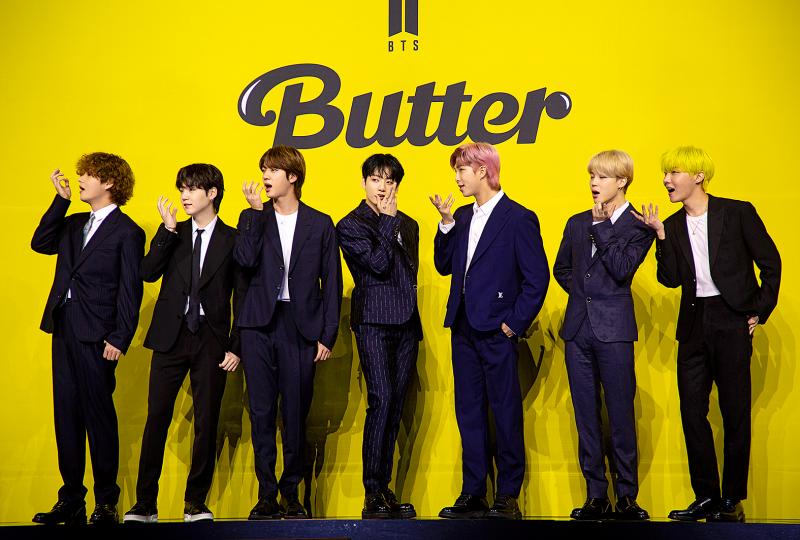Interest in anime, gaming and K-pop is fuelling a boom in Korean and Japanese university degrees that is helping to revive modern languages departments struggling with falling enrollments.
Acceptances to study Korean more than trebled from 50 to 175 between 2012 and 2018, while Japanese places grew by 71 percent in the same period, according to a report published this year by the University Council of Modern Languages (UCML). More students now study Korean than Russian, and more take Japanese than Italian, the report shows.
Experts who spoke to the Guardian said this was due to the popularity of east Asian culture — in particular K-pop and J-pop, Japanese video games, anime and popular films such as Parasite, and series such as the violent survival drama Squid Game — which has been boosted by their accessibility on platforms such as Netflix and Spotify.

Photo: AP
According to Netflix data, the South Korean series Squid Game is comfortably its most viewed show of all time, with 1.65 billion hours of the series streamed in the first four weeks after its release date.
The rising popularity of Korean culture in particular, a phenomenon referred to as the Korean wave or K-wave, or hallyu, is influencing trends in a number of sectors, from cosmetics and fashion to food and household appliances.
SHIFT IN INTEREST

Photo: EPA-EFE
At the heart of the K-wave is K-pop, which in 2017 was already estimated to be a nearly US$5 billion industry. The South Korean K-pop group BTS set a new record and made headlines for achieving the most YouTube views for a music video debut — more than 101.1 billion within 24 hours for last year’s song Dynamite.
Emma Cayley, UCML’s chief executive, said: “It is clear that there has been a shift away from more traditionally taught European languages to non-European.”
She said this included Arabic and Chinese, which combined with Japanese and Korean are driving the recovery of the study of languages and culture in universities.

Photo: AFP
A recent UCML study based on universities self-reporting their language provision suggested the proportion of universities offering Japanese rose from 19 percent in 2018 to 39 percent this school year, while a small increase was observed in departments offering Korean.
Lecturers say students often start studying Korean and Japanese as a hobby while at school on language-learning platforms such as Duolingo, with recent figures in the UK showing Japanese was the fastest-growing language and Korean the fourth fastest.
CULTURAL INTEREST

Photo: AFP
“They started learning Japanese just casually, for fun, and then they thought ‘this is fun’ so they want to study more seriously either as a degree or as an optional subject,” said Kazuki Morimoto, a Japanese lecturer at the University of Leeds.
Morimoto said he had noticed a shift away from students opting to combine Japanese with business or economics 10 to 20 years ago to improve their job prospects, towards students studying the language and culture by itself for the love of it, although many do still find jobs connected to Japan as graduates.
He thinks young people have been influenced by the spread of the culture on social media as well as by a strategic program of cultural diplomacy initiated by the Japanese government in the run-up to the rugby World Cup and Tokyo Olympics. Many students were also drawn to the prospect of a year in Japan, he added.
Jaeuk Park, a Korean lecturer at Leeds, said his students typically studied Korean as a result of their love for K-pop and K-dramas, although some were also interested in understanding more about North Korea, a notoriously secretive nation.
Sarah Keith, who researches Korean popular culture at Macquarie University in Australia, said its appeal to westerners was a result of “how global culture is now,” with many Korean creators having grown up consuming Hollywood films and European culture.
As a result, their cultural outputs are a “balance of familiarity and novelty” that westerners find compelling. “For example in Squid Game, the dramatic pacing and arc of the show are intelligible to viewers worldwide, but at the same time it engages with specifically Korean themes which are totally new to foreign audiences,” she said.

Towering high above Taiwan’s capital city at 508 meters, Taipei 101 dominates the skyline. The earthquake-proof skyscraper of steel and glass has captured the imagination of professional rock climber Alex Honnold for more than a decade. Tomorrow morning, he will climb it in his signature free solo style — without ropes or protective equipment. And Netflix will broadcast it — live. The event’s announcement has drawn both excitement and trepidation, as well as some concerns over the ethical implications of attempting such a high-risk endeavor on live broadcast. Many have questioned Honnold’s desire to continues his free-solo climbs now that he’s a

As Taiwan’s second most populous city, Taichung looms large in the electoral map. Taiwanese political commentators describe it — along with neighboring Changhua County — as Taiwan’s “swing states” (搖擺州), which is a curious direct borrowing from American election terminology. In the early post-Martial Law era, Taichung was referred to as a “desert of democracy” because while the Democratic Progressive Party (DPP) was winning elections in the north and south, Taichung remained staunchly loyal to the Chinese Nationalist Party (KMT). That changed over time, but in both Changhua and Taichung, the DPP still suffers from a “one-term curse,” with the

Jan. 26 to Feb. 1 Nearly 90 years after it was last recorded, the Basay language was taught in a classroom for the first time in September last year. Over the following three months, students learned its sounds along with the customs and folktales of the Ketagalan people, who once spoke it across northern Taiwan. Although each Ketagalan settlement had its own language, Basay functioned as a common trade language. By the late 19th century, it had largely fallen out of daily use as speakers shifted to Hoklo (commonly known as Taiwanese), surviving only in fragments remembered by the elderly. In

Lines between cop and criminal get murky in Joe Carnahan’s The Rip, a crime thriller set across one foggy Miami night, starring Matt Damon and Ben Affleck. Damon and Affleck, of course, are so closely associated with Boston — most recently they produced the 2024 heist movie The Instigators there — that a detour to South Florida puts them, a little awkwardly, in an entirely different movie landscape. This is Miami Vice territory or Elmore Leonard Land, not Southie or The Town. In The Rip, they play Miami narcotics officers who come upon a cartel stash house that Lt. Dane Dumars (Damon)